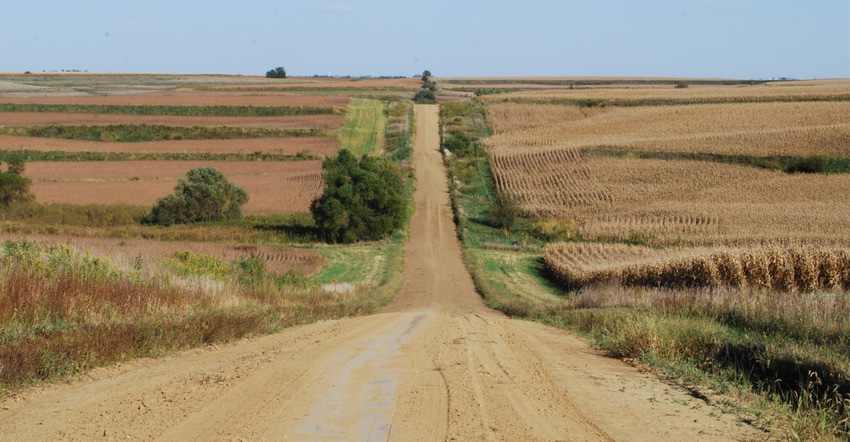September 26, 2018

This issue comes up frequently at harvesttime: access to farmland and the legal rights of landowners. Last month, I received an interesting question from a reader with a land access issue.
For many years, the reader rented about 3 acres to a neighboring farmer to allow that farmer to obtain access to a field he was farming in exchange for a rental payment on those 3 acres. The access agreement between the reader and the farmer was part of the lease as a “right-of-way” clause.
The farmer recently sold his property, and the new owner will not agree to pay the reader through the lease to access the farmland as had happened in the past. The reader’s question was whether he had to provide the same access he had provided in the past to the new owner without any payment.
Is parcel landlocked?
The first question to address is whether the parcel the new owner is trying to access is truly landlocked. If the parties can’t come to a voluntary easement agreement, the Iowa Code provides options. Iowa Code §6A.4, among other things, grants owners of landlocked parcels a right of way through “adjacent” private land if they initiate a condemnation proceeding seeking access through the “nearest feasible route.”
In a recent Iowa Court of Appeals case, Finnegan v. Dickson, the court found that owners of a landlocked parcel had a right to condemn the adjoining land and get a new access road because they did not have an existing route by which to access a public road from their property. However, the court reminded us that landlocked owners have to propose an access route that is either “located adjacent to a division, subdivision, or forty line and which was the nearest feasible route to an existing public road or … along a route established for 10 years or more by an easement or by use and travel by the owner of the property and the general public.”
What if parcel isn’t landlocked?
If the land the owner is seeking access to is not landlocked, the second question is whether the person seeking access has essentially already established an easement by using and accessing the property. This is called an “easement by prescription” and is similar to the concepts of “boundary by acquiescence” and “adverse possession.”
To successfully claim a prescriptive easement, the claimant must show he or she used the access route under a claim of right of title — openly, notoriously, continuously and hostilely for 10 years or more. This can be a hard concept to prove.
So, if the farm is not landlocked or the access route hasn’t been established by use for 10 years or more, or there is no other legal claim to the property, the landowners would need to come to a voluntary agreement regarding access and any payment associated with that access.
Questions on ag nuisance suits
As I mentioned last month, we’ve received several questions from readers recently regarding ag nuisance lawsuits. There has been a lot of talk about the impact, if any, for Iowa livestock farmers in light of the outcome of nuisance lawsuits in three federal court cases in North Carolina where juries returned verdicts against Smithfield Foods, finding its contract hog operations a nuisance and awarding what has been reported as $97.8 million in compensatory and punitive damages.
While those cases are being appealed by Smithfield, they have attracted a lot of public attention.
However, there have been other cases in Illinois, Minnesota and Iowa, where juries found hog operations were not a nuisance and declined to award any damages. These cases did not receive as much attention.
According to Eldon McAfee, legal counsel for the Iowa Pork Producers and my law partner at Brick Gentry P.C., it is important to remember that jury verdicts do not set legal precedent for other cases, both in North Carolina as well as other states. Further, according to McAfee, these cases do illustrate that the outcomes of farm nuisance cases are specific to the individual facts of each case.
Continue to obey environmental laws
McAfee’s advice in the wake of the recent nuisance jury verdicts is for producers to continue to focus on meeting, and if reasonably possible, exceeding all applicable environmental laws and using industry accepted management practices reasonable for their individual operation.
It should be noted there are several upcoming ag nuisance lawsuits going to trial in the next few years, including cases in Poweshiek, Louisa, Buchanan, Henry, Jefferson, Des Moines, Wright and Wapello counties and one in federal district court. We will continue to monitor these issues and provide readers with updates.
Another topic for discussion is “Farm Data: Who owns it, who controls it?” Check back next month when we’ll discuss new legal developments regarding farm data, including agronomic data, computer data and weather data. We will update readers on the status of the law surrounding data and some tips for protecting your farming operation.
Herbold-Swalwell is an attorney with Brick-Gentry in Des Moines. You can contact her at [email protected].
About the Author(s)
You May Also Like






